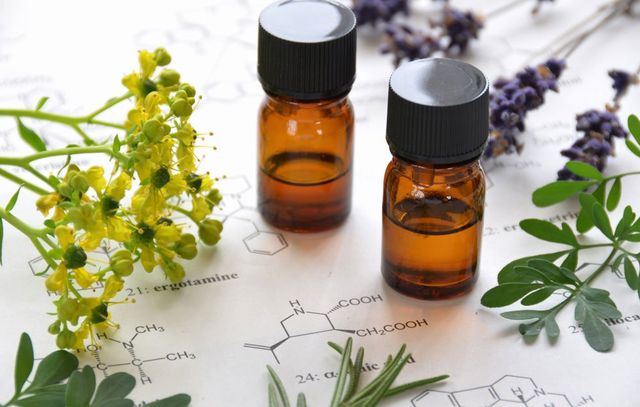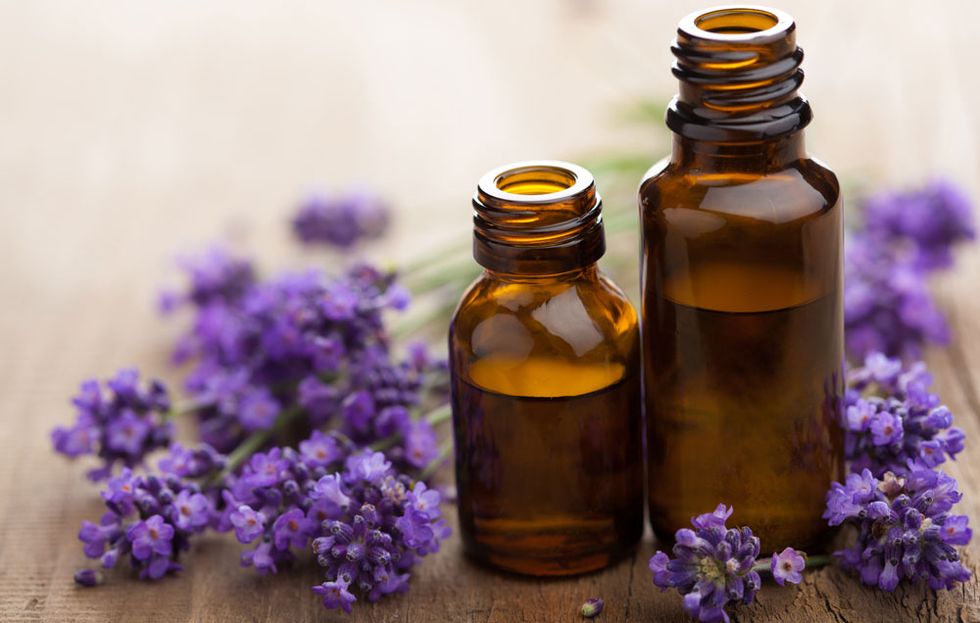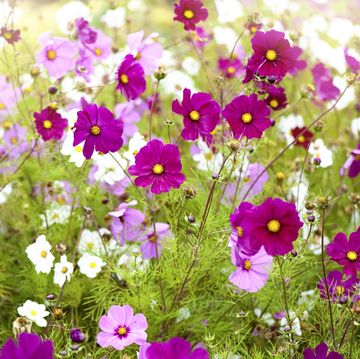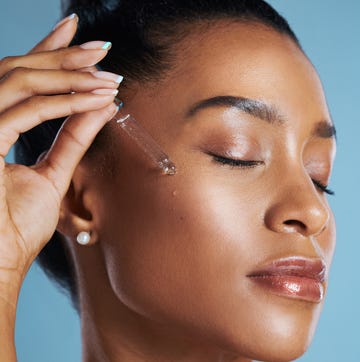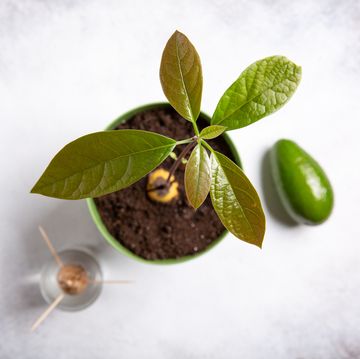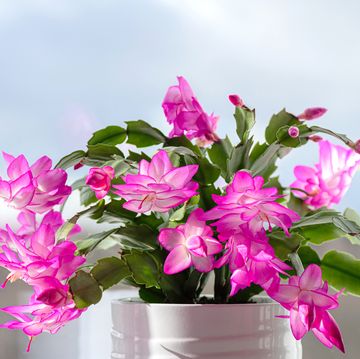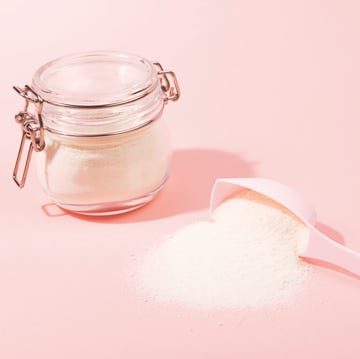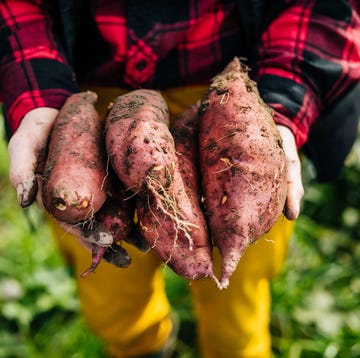This story originally appeared on Rodale’s Organic Life in January 2017.
Essential oils are no longer the domain of hippies who like the smell of patchouli. Alternative and integrative medicine has never been more popular, according to the Mayo Clinic, and more and more consumers look for essential oils on organic body lotion labels as a safer alternative to hazardous synthetic fragrances.
So what, exactly, is an essential oil? Many people mistakenly think that an essential oil is a plant extract mixed with some other type of oil, but essential oils are actually 100 percent plant extract, which means they’re extremely concentrated. According to the U.S. National Library of Medicine, it takes 220 pounds of lavender flowers to make just one pound of lavender essential oil.
“People tend to think that because essential oils are natural items, they must be safe. Actually, essential oils are so enormously concentrated that they’re not the same, medically, as the herbs or citrus they’re extracted from. That’s why they can be dangerous—but it’s also why they’re useful,” says Rachel Carlton Abrams, MD, who is board certified in family medicine and integrative medicine, and author of the new book Bodywise: Discovering Your Body’s Intelligence for Lifelong Health and Healing.
Here are six situations where you should always avoid essential oils, along with advice for using them safely.
Undiluted, In Most Circumstances
Because essential oils are so highly concentrated, using them straight-up can cause rashes and even burns. And mixing them with water isn’t going to do the trick because, well, oil and water don’t mix. “Even though I should have known better, I once added lavender oil to my bathwater, thinking it would be nice and relaxing,” Carlton Abrams says. “I jumped out immediately, and I had tiny red splotches all over my body.”
To safely use essential oils on your skin, you need to first dilute them in a carrier oil, such as jojoba, avocado, or grapeseed. According to Carlton Abrams, a good ratio to follow is no more than 3-5 drops of essential oil per one teaspoon of carrier oil. You can also safely add essential oils to homemade soaps, shampoos, and lotions. There are a few circumstances in which you can use an undiluted essential oil directly on the skin, but you should talk to a reputable practitioner before trying it. (For example, lavender oil applied directly to bee stings and burns is a safe remedy that works, according to Carlton Abrams.)
Related: 7 Mistakes You’re Making With Essential Oils
On Mucous Membranes
We’ve already talked about why you should never use pure essential oils on skin, but that’s a thousand times more important when it comes to mucous membranes—the tissue that lines body cavities like the mouth, throat, and vagina. “I once had a patient who'd heard tea tree oil can be used to treat yeast infections—so she soaked a tampon in it,” Carlton Abrams recalls. “Not only did she have a yeast infection, but she also had a burning, inflamed vulva.” The patient wasn’t entirely wrong, though. Carlton Abrams says that tea tree oil can be used for yeast infections—she even recommends a safe and effective essential oil-based product with tea tree to her patients—but it’s too risky to use it as a home remedy.
Internally, Without Talking To A Doctor
Essential oil capsules are available over-the-counter at health food stores and natural pharmacies. You can purchase them any time you want, without consulting with a doctor, and that, says Carlton Abrams, has led to misconceptions that they’re always fine to take. “I worry about people taking them on their own,” she says, because essential oils can be just as powerful as conventional medicines.
Related: 5 Best Essential Oils For Anxiety
Take antibiotics, for example. Carlton Abrams says studies have found that oregano and thyme essential oils work just as well as traditional antibiotics for treating infections caused by bacteria, fungi, or parasites. That’s great news, as bacteria is becoming increasingly resistant to antibiotics. These essential oils reduce overgrowth of bad bacteria in the gut—but, like antibiotics, they destroy good bacteria, too. “I’ve seen people who think that they can take essential oil capsules all the time as a preventative measure against bad gut bacteria. But they deplete good gut bacteria, too, just like antibiotics,” Carlton Abrams says. “I determine if a patient needs essential oil antibiotics by ordering a stool culture, which is the same protocol I’d follow before prescribing regular antibiotics as well.”
Also, essential oil capsules (at the recommendation of a reputable practitioner!) are the only kind of essential oils that should ever be traveling down your throat. The liquid kind that come in the tiny dropper bottles are for external use only. They’ll burn on the way down (see above, regarding mucous membranes). The essential oil capsules have a coating to ensure they can travel safely to your gut, where you stomach acid can break them down.
As Skin Care, If You Have Fair Skin
Some essential oils, particularly the citrus scents, are phototoxic. That means they make your skin more sensitive to the sun, causing you to get more severe sun burns. Avoid using citrus essential oils in your skincare routine if you’re going to be spending time outdoors, particularly if you’re already at a high risk of sunburn.
Related: 3 Essential Oils That Can Ease Your Allergies
If You’re Allergic
You should also be cautious with essential oils if you have a hard time tolerating fragrances. According to Carlton Abrams, people who are sensitive to synthetic fragrances can sometimes tolerate essential oils—our bodies are used to them because they’re derived from plants that we’ve coexisted with for centuries, unlike synthetics. Still, even essential oils’ natural scents can be too much for some people, so be cautious about introducing them to your personal care products if you know you’re scent-sensitive.
It's always a good idea to test a new essential oil (properly diluted with a carrier oil, of course) on a small patch of skin, like the inner arm, before using it on your entire body. If you get a rash, skip it.
If You’re Pregnant
This one you’ve probably heard before—it’s always written on essential oil bottles in scary capital letters. Carlton Abrams says that’s simply because essential oils are very powerful and there’s so much we still don’t know about how they affect our bodies. She says you should definitely avoid taking them internally during pregnancy, though using a lotion or bath product that contains essential oils is generally safe.
Essential oil maker Aura Cacia specifies that asil, clary sage, clove bud, hyssop, sweet fennel, juniper berry, marjoram, myrrh, rosemary, sage, thyme, and wintergreen should be avoided at all costs during pregnancy. However, they say florals that are usually found in skincare products, like lavender, rose, and chamomile, are OK to use.
